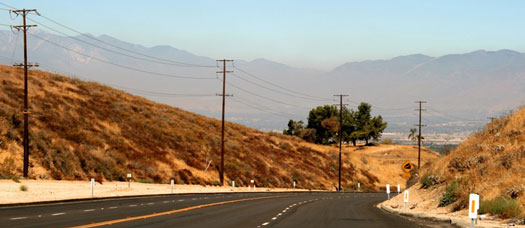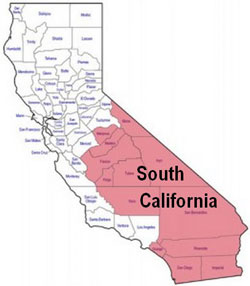… Santa Catalina is a-waiting for me.
Continue reading
California
 It turns out they’re mostly in California. But for the full list we go to Environment America’s clean air report (PDF). Continue reading
It turns out they’re mostly in California. But for the full list we go to Environment America’s clean air report (PDF). Continue reading
 Riverside County Supervisor Jeff Stone proposes that California be split in two. The new state, which he wants to call “South California,” will comprise of the counties of Orange, San Diego, Fresno, Imperial, Inyo, Kern, Kings, Madera, Mariposa, Mono, Riverside, San Bernardino and Tulare. I live in Kern, so needless to say, I’m pretty interested in how this goes.
Riverside County Supervisor Jeff Stone proposes that California be split in two. The new state, which he wants to call “South California,” will comprise of the counties of Orange, San Diego, Fresno, Imperial, Inyo, Kern, Kings, Madera, Mariposa, Mono, Riverside, San Bernardino and Tulare. I live in Kern, so needless to say, I’m pretty interested in how this goes.
Stone has said, “Our taxes are too high, our schools don’t educate our children well enough, unions and other special interests have more clout in the Legislature than the general public.” OBVIOUSLY the only sane solution is to form your own state that consists of counties where nobody wants to live. Because the only thing keeping California down is the massive amounts of tax dollars coming in from Los Angeles and the Bay Area. The Riverside County board of Supervisors voted 4-0 to see where this goes, but with the proviso that no public funds be spent on it. I really hope this is their way of giving this guy a Kong to keep him entertained. Continue reading
Today California Governor Jerry Brown vetoed a budget plan that in large part he put together. The original plan had called for spending cuts in the budget and a package of tax increases that would have been put up for a vote for all Californians to decide on. Republicans in the state assembly managed to block the statewide popular vote on the tax increases leaving only the tax cuts in the budget which alone did not provide a balanced and sustainable budget. I guess the Republicans think the people should not be allowed to decide to increase their own taxes to fix a massive budget problem. Bring on the bickering. Source SFGate. Comment
Last month the California Public Utilities Commission issued a ruling that limited the powers of Pacific Gas and Electric in dictating the kinds of technology customers were required to have in their home. At issue were Smart Meters, a digital monitoring technology that allows the PG&E to more accurately monitor gas and electricity usage and reduce the need for manual meter readings. The utility company has already installed thousands of the meters in Northern California, and plans to roll out thousands more over the next few years. PG&E claims that the meters will be more efficient than traditional meters and will allow for more sensitive pricing which will increase efficiency in energy use. Now because of the ruling, PG&E must offer different metering alternatives for customers who do not want smart meters.
However, critics argue that the meters are a health hazard and violate customer privacy. Opponents of the meters assert that the meters cause headaches, heart problems, insomnia, and nausea because of the communication technology used to transmit data from the home to the power company. Smart meters are wireless devices that emit small amounts of electromagnetic radiation when they transmit. This raises protests from people who consider themselves “electrosensitive.” According to advocacy groups for the electrosensitive, radio and microwaves, even in trace amounts, cause certain people to become ill when exposed to technology like smart meters.
However, the problem with these arguments is that smart meters have been found to be well with in guidelines for safe usage in homes and businesses. While there are legitimate concerns about wireless technology (particularly cell phones), there has been no conclusive evidence that wireless technology is unsafe in any way. The issues found with cell phones are only when the phones are within centimeters of the brain and smart meters are installed on the exterior of buildings, well away from where people keep their brains. Furthermore, there is simply no evidence that electrosensitivity exists at all. While opponents of smart meters provide anecdotal evidence, there is simply no science to back up the claim that radio waves make you sick.
The conflict over smart meters is nothing new. It is the same fear advanced by opponents to radio and cell phone towers, as well as electric power lines. There is no evidence that any of those things make you sick either, but that has not stopped opposition from the public to these forms of technology. The reality is that the concerns of a few misinformed but well-meaning people are stopping the universal adoption of smarter energy policy. These efforts may be crucial in our struggle to make efficient energy policies and reduce the impacts of global climate change, which could kill lots of people through increased skin cancer rates, decreased food production, or geographic displacement. In a desire to stay personally healthy these individuals may not be able to see the technology forests for the trees, and may be missing the long term risks of bad energy practices. While PG&E has no choice to accommodate its customers, this issue underscores the need for a wider public discussion about emerging technologies and about what constitutes good public science and policy.
I love San Francisco. Like any big city, we have our problems. Yes, we are on occasion a bit preachy and sanctimonious. Our politics can be screwy. We get made fun of for stuff like the Happy Meals kerfuffle. But great things happen here also, sometimes this can be a downright exciting city to live in.
Not only is it a lovely city to live in (most of the time), it’s a wonderful city to visit. Apologies for the length (and number of Italian restaurants, but hey – it is San Francisco), and away we go. Continue reading